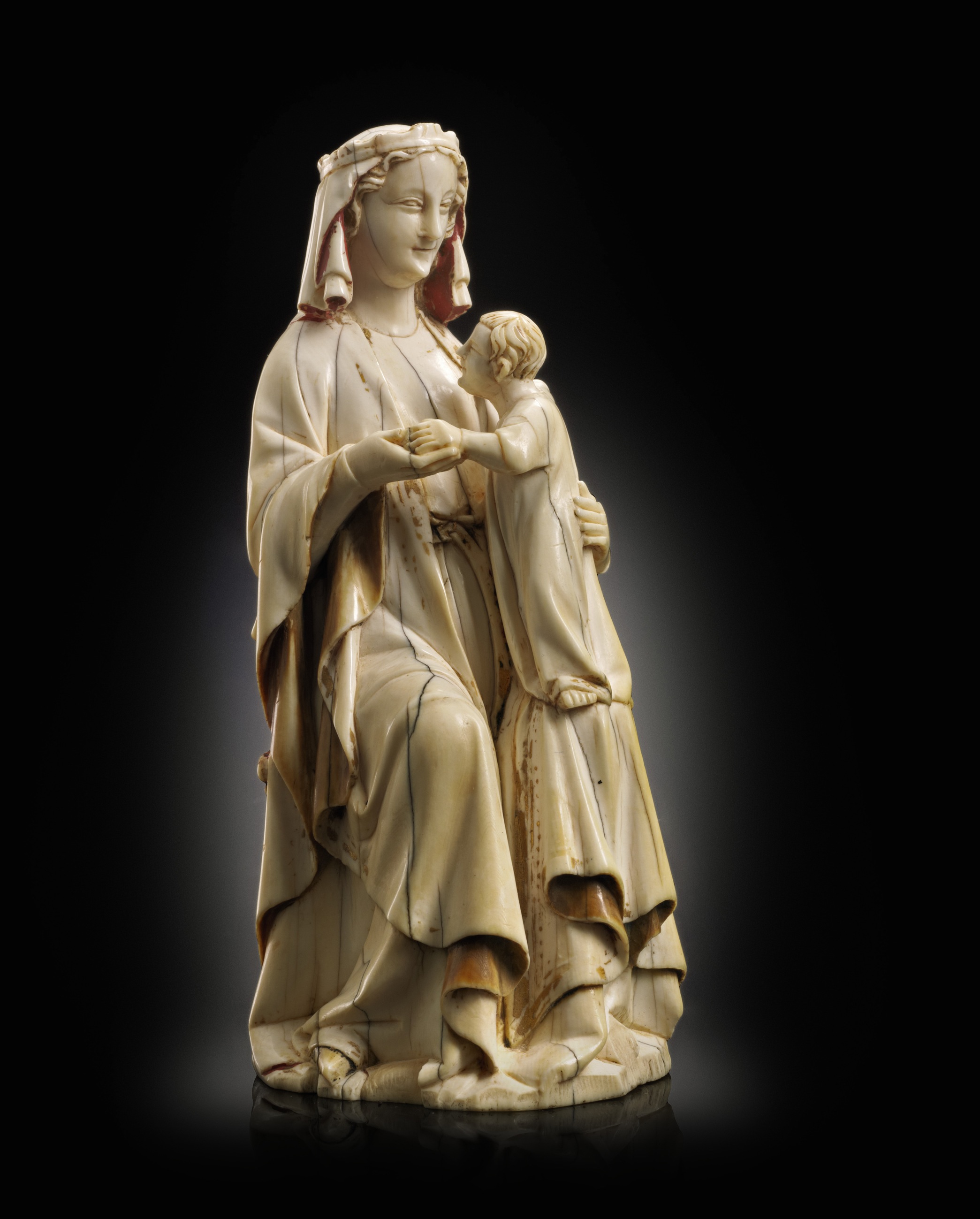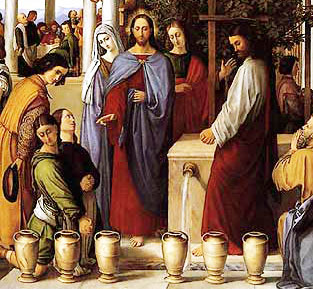As introduced in the last post, Mary and Jesus ended their happy and sacred time on earth together at the Wedding Feast at Cana. Newman writes a long meditation on her suffering after that day. I repeat it here.
Today, let us honor our mothers for their steadfastness to the Faith, if they are Catholic, and to their loving life, as they bore us and gave us to the world.
If one has lost one's mother, one can honor her with prayers and masses.
If one experienced a mother who was not good and even a great sinner, pray for her today, on this day of honoring mothers.
from Newman...
The last day of the earthly intercourse between Jesus and Mary was at the marriage feast at Cana. Yet even then there was something taken from that blissful intimacy, for they no longer lived simply for each other, but showed themselves in public, and began to take their place in the dispensation which was opening. He manifested forth His glory by His first miracle; and hers also, by making her intercession the medium of it. He honoured her still more, by breaking through the appointed order of things for her sake, and though His time of miracles was not come, anticipating it at her instance. While He wrought His miracle, however, He took leave of her in the words "Woman, what is between thee and Me?" Thus He parted with her absolutely, though He parted with a blessing. It was leaving Paradise feeble and alone.
7. For in truth it was fitting that He who was to be the true High Priest, should thus, while He exercised His office for the whole race of man, be free from all human ties, and sympathies of the flesh. And one reason for His long abode at Nazareth with His Mother may have been to show, that, as He gave up His Father's and His own glory on high, to become man, so He gave up the innocent and pure joys of His earthly home, in order that He might be a Priest. So, in the old time, Melchisedech is described as without father or mother. So the Levites showed themselves truly worthy of the sacerdotal office and were made the sacerdotal tribe, because they steeled themselves against natural affection, said to father or mother, "I know you not," and raised the sword against their own kindred, when the honour of the Lord of armies demanded the sacrifice. In like manner our Lord said to Mary, "What is between Me and thee?" It was the setting apart of the sacrifice, the first ritual step of the Great Act which was to be solemnly performed for the salvation of the world. "What is between Me and thee, O woman?" is the offertory before the oblation of the Host. O my dear Lord, Thou who hast given up Thy mother for me, give me grace cheerfully to give up all my earthly friends and relations for Thee.
8. The Great High Priest said to His kindred, "I know you not." Then, as He did so, we may believe that the most tender heart of Jesus looked back upon His whole time since His birth, and called before Him those former days of His infancy and childhood, when He had been with others from whom He had long been parted. Time was when St. Elizabeth and the Holy Baptist had formed part of the Holy Family. St. Elizabeth, like St. Joseph, had been removed by death, and was waiting His coming to break that bond which detained both her and St. Joseph from heaven. St. John had been cut off from his home and mankind, and the sympathies of earth, long since—and had now begun to preach the coming Saviour, and was waiting and expecting His manifestation.
Give me grace, O Jesus, to live in sight of that blessed company. Let my life be spent in the presence of Thee and Thy dearest friends. Though I see them not, let not what I do see seduce me to give my heart elsewhere. Because Thou hast blessed me so much and given to me friends, let me not depend or rely or throw myself in any way upon them, but in Thee be my life, and my conversation and daily walk among those with whom Thou didst surround Thyself on earth, and dost now delight Thyself in heaven. Be my soul with Thee, and, because with Thee, with Mary and Joseph and Elizabeth and John.
9. Nor did He, as time went on, give up Mary and Joseph only. There still remained to Him invisible attendants and friends, and He had their sympathy, but them He at length gave up also. From the time of His birth we may suppose He held communion with the spirits of the Old Fathers, who had prepared His coming and prophesied of it. On one occasion He was seen all through the night, conversing with Moses and Elias, and that conversation was about His Passion. What a field of thought is thus opened to us, of which we know how little. When He passed whole nights in prayer, it was greater refreshment to soul and body than sleep. Who could support and (so to say) re-invigorate the Divine Lord better than that "laudabilis numerus" of Prophets of which He was the fulfilment and antitype? Then He might talk with Abraham who saw His day, or Moses who spoke to Him; or with His especial types, David and Jeremias; or with those who spoke most of Him, as Isaias and Daniel. And here was a fund of great sympathy. When He came up to Jerusalem to suffer, He might be met in spirit by all the holy priests, who had offered sacrifices in shadow of Him; just as now the priest recalls in Mass the sacrifices of Abel, Abraham, and Melchisedech, and the fiery gift which purged the lips of Isaias, as well as holding communion with the Apostles and Martyrs.
10. Let us linger for a while with Mary—before we follow the steps of her Son, our Lord. There was an occasion when He refused leave to one who would bid his own home farewell, before he followed Him; and such was, as it seems, almost His own way with His Mother; but will He be displeased, if we one instant stop with her, though our meditation lies with Him? O Mary, we are devout to thy seven woes—but was not this, though not one of those seven, one of the greatest, and included those that followed, from thy knowledge of them beforehand? How didst thou bear that first separation from Him? How did the first days pass when thou wast desolate? where didst thou hide thyself? where didst thou pass the long three years and more, while He was on His ministry? Once—at the beginning of it—thou didst attempt to get near Him, and then we hear nothing of thee, till we find thee standing at His cross. And then, after that great joy of seeing Him again, and the permanent consolation, never to be lost, that with Him all suffering and humiliation was over, and that never had she to weep for Him again, still she was separated from him for many years, while she lived in the flesh, surrounded by the wicked world, and in the misery of His absence.
11. The blessed Mary, among her other sorrows, suffered the loss of her Son, after He had lived under the same roof with her for thirty years. When He was no more than twelve, He gave her a token of what was to be, and said, "I must be about my Father's business;" and when the time came, and He began His miracles, He said to her, "What is to Me and to thee?"—What is common to us two?—and soon He left her. Once she tried to see Him, but in vain, and could not reach Him for the crowd, and He made no effort to receive her, nor said a kind word; and then at the last, once more she tried, and she reached him in time, to see Him hanging on the cross and dying. He was only forty days on earth after His resurrection, and then He left her in old age to finish her life without Him. Compare her thirty happy years, and her time of desolation.
12. I see her in her forlorn home, while her Son and Lord was going up and down the land without a place to lay His head, suffering both because she was so desolate and He was so exposed. How dreary passed the day; and then came reports that He was in some peril or distress. She heard, perhaps, He had been led into the wilderness to be tempted. She would have shared all His sufferings, but was not permitted. Once there was a profane report which was believed by many, that He was beside Himself, and His friends and kindred went out to get possession of Him. She went out too to see Him, and tried to reach Him. She could not for the crowd. A message came to Him to that effect, but He made no effort to receive her, nor said a kind word. She went back to her home disappointed, without the sight of Him. And so she remained, perhaps in company with those who did not believe in Him.
13. I see her too after His ascension. This, too, is a time of bereavement, but still of consolation. It was still a twilight time, but not a time of grief. The Lord was absent, but He was not on earth, He was not in suffering. Death had no power over Him. And He came to her day by day in the Blessed Sacrifice. I see the Blessed Mary at Mass, and St. John celebrating. She is waiting for the moment of her Son's Presence: now she converses with Him in the sacred rite; and what shall I say now? She receives Him, to whom once she gave birth.
O Holy Mother, stand by me now at Mass time, when Christ comes to me, as thou didst minister to Thy infant Lord—as Thou didst hang upon His words when He grew up, as Thou wast found under His cross. Stand by me, Holy Mother, that I may {318} gain somewhat of thy purity, thy innocence, thy faith, and He may be the one object of my love and my adoration, as He was of thine.















